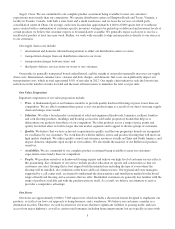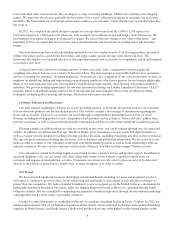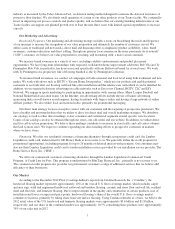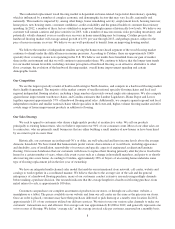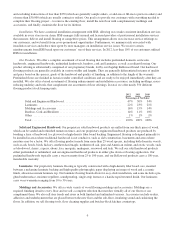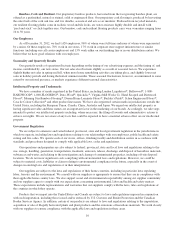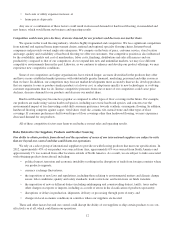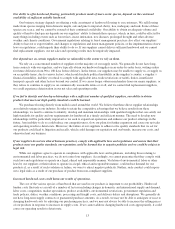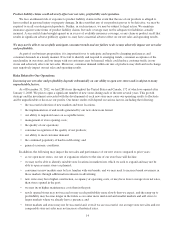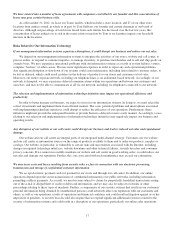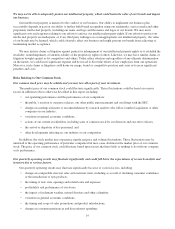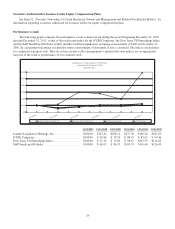Lumber Liquidators 2012 Annual Report Download - page 21
Download and view the complete annual report
Please find page 21 of the 2012 Lumber Liquidators annual report below. You can navigate through the pages in the report by either clicking on the pages listed below, or by using the keyword search tool below to find specific information within the annual report.Finally, our progress in opening new stores from quarter to quarter may occur at an uneven rate, which may result in
quarterly net sales and profit growth falling short of market expectations in some periods.
Our net sales and profit growth could be adversely affected if comparable store net sales are less than we expect.
While future net sales growth will depend substantially on our plans for new store openings, the level of comparable
store net sales (which represent the change in period-over-period net sales for stores beginning their thirteenth full month of
operation) will also affect our sales growth and business results. Among other things, increases in our baseline store volumes
and the number of new stores opened in existing markets, which tend to open at a higher base level of net sales, will impact
our comparable store net sales. As a result, it is possible that we will not achieve our targeted comparable store net sales
growth or that the change in comparable store net sales could be negative. If this were to happen, net sales and profit growth
would be adversely affected.
Increased transportation costs, particularly those relating to the cost of fuel, could harm our results of operations.
The efficient transportation of our products through our supply chain is a critical component of our operations. If the
cost of fuel or other costs, such as import tariffs, duties and international container rates, rise, it could result in increases in
our cost of sales due to additional transportation charges and in the fees delivery companies charge us to transport our
products to our stores and customers. We may be unable to increase the price of our products to offset increased
transportation charges, which could cause our operating results to deteriorate.
Damage, destruction or disruption of our Toano or Hampton Roads facilities could significantly impact our operations
and impede our ability to finish and distribute our products.
Our Toano facility serves as our corporate headquarters and, among other things, houses our primary computer systems,
which control our management information and inventory management systems. In addition, we currently finish
approximately 92% of all Bellawood products, as well as small quantities of certain other products, there. In 2012,
Bellawood flooring accounted for approximately 13% of our net sales. Further, the Toano facility, along with our facilities in
Hampton Roads, serves as our distribution centers. If the Toano facility, the Hampton Roads facilities or our inventory held
in those locations were damaged or destroyed by fire, wood infestation or other causes, our entire finishing and/or
distribution processes would be disrupted, which could cause significant lost production and delays in delivery. This could
impede our ability to stock our stores and deliver products to our customers, and cause our net sales and operating results to
deteriorate.
Federal, provincial, state or local laws and regulations, or our failure to comply with such laws and regulations, could
increase our expenses, restrict our ability to conduct our business and expose us to legal risks.
We are subject to a wide range of general and industry-specific laws and regulations imposed by federal, provincial,
state and local authorities in the countries in which we operate including those related to customs, foreign operations (such as
the Foreign Corrupt Practices Act), truth-in-advertising, consumer protection, privacy, zoning and occupancy matters as well
as the operation of retail stores and warehouse, production and distribution facilities. In addition, various federal, provincial
and state laws govern our relationship with and other matters pertaining to our employees, including wage and hour laws,
requirements to provide meal and rest periods or other benefits, family leave mandates, requirements regarding working
conditions and accommodations to certain employees, citizenship or work authorization and related requirements, insurance
and workers’ compensation rules and anti-discrimination laws. If we fail to comply with these laws and regulations, we could
be subject to legal risk, our operations could be impacted negatively and our reputation could be damaged. Likewise, if such
laws and regulations should change, our costs of compliance may increase, thereby impacting our results and hurting our
profitability.
Certain portions of our operations are subject to laws and regulations governing the use, storage, handling, generation,
treatment, emission, release, discharge and disposal of certain hazardous materials and wastes, the remediation of
contaminated soil and groundwater and the health and safety of employees. If we are unable to extend or renew a material
approval, license or permit required by such laws, or if there is a delay in renewing any material approval, license or permit,
that may cause our net sales and operating results to deteriorate or otherwise harm our business.
15


